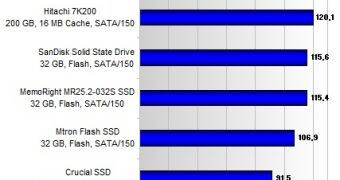Two days ago, we brought some news according to which Solid State Drives are not as power efficient as everybody thought they were. Even more, these flash-based drives consume more power than regular magnetic drives reducing laptop battery life. The news came from a Tom's Hardware article that put a series of SSDs through a number of tests, which led to the conclusion that SSDs aren't all that power efficient.
Because of that article, everybody is worried about the future of storage products, as Solid State Drives have been set to replace HDDs as the main storage device. The low power-consumption feature is one of the key selling points for SSD manufacturers, which claim that their solution provides a better alternative to current HDDs. But the Tom's Hardware review proved otherwise, putting SSD manufacturers in a bad light.
As a follow-up to that article, a number of Solid State Drive makers have expressed their opinion on the matter, promising that their upcoming products will come with better power management. Intel, which wasn't present in the review, declared on Wednesday that flash-based drives "can be architected to improve battery life." Which leaves us to conclude that Intel's expected drives, which will come with capacities ranging from 80GB to 160GB, will be more power efficient than current HDDs, although we can't be really certain until the drives come out.
Patrick Wilkison, the Vice President of marketing and business development at STEC, has also provided some insight on the matter. STEC is another solid state drive maker and, according to its VP, the drives used in the above mentioned review deal with first-generation technology and don't necessarily express the power requirements of upcoming drives. "They are using legacy drives, none of which will be used by any major PC OEM," Wilkison said.
Micron Technology, which had its drives tested in the review, released a statement on Thursday, according to which it would launch its next-generation RealSSD product by the end of this year. Dean Klein, Vice President of memory system development for Micron, has expressed its opinion on the matter:
"The controllers analyzed in the Tom's Hardware review are early-generation, multi-chip and in some cases even use FPGAs (field programmable gate arrays), which can be quite power hungry. As with many other first and second generation drives, these drives are not delivering on the full potential of the NAND and are not delivering properly on the performance promise."
He further added that the CPU might also be responsible for the high power consumption level and that "today's applications and operating system aren't optimized for SSDs, but for rotating media."

 14 DAY TRIAL //
14 DAY TRIAL //